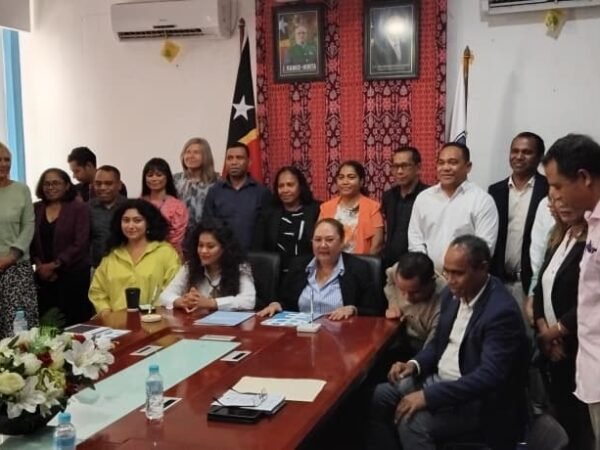Dili, September 11, 2025 (Média Democracia) – The Ministry of Education and UN Women Timor-Leste signed a Memorandum of Understanding (MoU) to deliver skills training under the economic participation project (STEP) in Timor-Leste. The MoU signing ceremony was held at the VIP Hall of the Ministry of Education.
Director-General for Policy Planning, Inclusion and Informatics, Odilia das Dores Martins, stated that the Ministry of Education today signed the MoU with UN Women, an international partner in Timor-Leste, to strengthen cooperation in education. She noted that UN Women has been working with the Ministry for a long time, and the MoU was renewed to extend collaboration for another five years with new training programs not yet available in Timor-Leste.
“This MoU focuses on new activities, particularly training that aims to empower women and girls economically in two municipalities, Oecusse and Lautem, which we have already targeted. This training is a response to our Phase III Maubisse Declaration, which emphasizes strengthening women’s economic independence so they are not directly dependent on others, but instead empowered to live with the skills they have, enabling them to start small businesses that generate income for themselves,” explained Odilia das Dores Martins.
She added that the training programs, financed by the UK International Development through UN Women, will be implemented jointly with the Ministry of Education within this year.
“This activity targets around 100 students, of which 80 must be girls and 20 boys, selected from existing programs and small groups. The first phase began with training 20 teachers, 10 from Lautem and 10 from Oecusse, who have already completed two weeks of training and received their certificates. These teachers will now return to their municipalities to prepare and deliver training for students starting on 16 September, targeting youth aged 16 to 18. This training will equip students with the skills to begin their own businesses after finishing school,” said Martins.
In an interview, UN Women’s Representative in Timor-Leste, Amy Nishtha Satyam, emphasized that the MoU between UN Women and the Ministry of Education formalizes an important strategic partnership for the implementation of the Skills Training for Economic Participation (STEP) Project, a pioneering initiative funded by the United Kingdom under the ASEAN-UK Girls’ Education Support Program (ASEAN-UK SAGE).
“This MoU formalizes a strategic partnership aimed at empowering girls and marginalized women in Lautem and Oecusse with market-relevant skills in entrepreneurship, as well as digital and financial literacy. The project leverages existing national education infrastructure, particularly Community Learning Centers (CLCs) and Technical and Vocational Education and Training (TVET) schools, to reach youth who are often excluded from formal education and employment pathways,” said Satyam.
She highlighted that the initiative is rooted in a commitment to address systemic barriers preventing young women from reaching their full potential. Despite high academic performance, many girls in Timor-Leste face disproportionate challenges in accessing decent jobs due to limited training opportunities, early marriage, and entrenched gender expectations. STEP, beginning with a small-scale pilot, will train 20 national teachers in gender-responsive pedagogy and entrepreneurship, who will then deliver a comprehensive course to 100 students (80 girls and 20 boys). The curriculum, developed with international expertise, is based on the local economic landscape and integrates practical exposure to local businesses, role models, and mentorship opportunities. The project also emphasizes community engagement to challenge gender norms and build sustainable pathways for women’s economic empowerment.
“STEP is implemented under the ASEAN-UK SAGE Program, a flagship ASEAN-UK initiative launched in 2023 and delivered by the British Council in collaboration with the Southeast Asian Ministers of Education Organization (SEAMEO), EdTech Hub, and the Australian Council for Educational Research (ACER). This five-year program aims to strengthen foundational learning across Southeast Asia by addressing systemic barriers, particularly for girls and marginalized groups. Through the three core pillars such as, foundational learning, out-of-school girls and marginalized groups, and addressing gender barriers to digital skills and employment—the program seeks to equip young people with the tools they need to thrive in a rapidly changing economy,” Satyam explained.
She further underlined that Timor-Leste’s participation in this program reflects its deepening engagement with ASEAN and its commitment to inclusive, gender-responsive education as a pathway to sustainable development.
“The STEP project supports ASEAN’s priorities on women’s economic empowerment, aligns with the ASEAN Community Vision 2025, and contributes to the implementation of gender-responsive Sustainable Development Goals. It also aligns with ASEAN’s 2025 vision for inclusive and technology-driven education and with the ASEAN Digital Plan 2025, while addressing thematic priorities in Technical and Vocational Education and Training (TVET) by linking non-formal education with market-oriented skills training,” Satyam stressed.
She concluded that the signing of this MoU marks a significant milestone in advancing the Government of Timor-Leste’s commitments to inclusive education, youth empowerment, and gender equality, as articulated in the Maubisse Declaration Phase III (2023-2028) and the Strategic Development Plan of the IX Constitutional Government (2011-2030). The STEP project will be implemented in close coordination with the Ministry of Education to ensure national ownership and alignment with Timor-Leste’s education and skills development priorities.
UN Women Timor-Leste emphasized: “This MoU is more than an agreement, it is a commitment to ensure that no girl is left behind. STEP is a transformative initiative that places skills, confidence, and opportunities directly in the hands of marginalized girls.”
The STEP project is part of ASEAN-UK SAGE’s broader mission to close foundational learning gaps and address gender-based exclusion across Southeast Asia. ASEAN-UK SAGE is an ASEAN cooperation program financed by UK International Development.
Report: Domingas
Photo: Domingas

